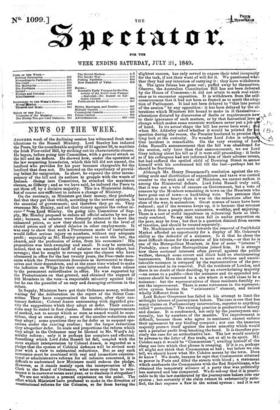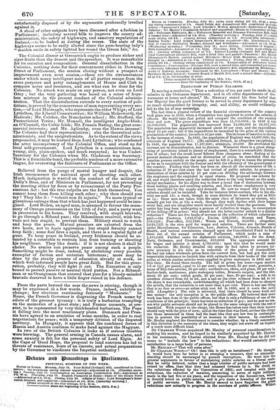NEWS OF THE WEEK.
ANOTHER week of the declining session has witnessed fresh mor- tifications to the Russell Ministry. Lord Stanley has induced the Peers, by the considerable majority of 35 against 26, to mutilate the Irish Poor-relief Bill, by striking out its characteristic clauses. He began, before going into Committee, with a general attack on the bill and its defects. He showed how, under the operation of the law respecting boundaries, which this bill did not amend, the landlord who provides for his poor becomes chargeable for the landlord that does not. He insisted on the expediency of provid- ing better for emigration. In short, he exposed the utter incom- petency of the bill and its authors to grapple with the wants of Ireland: Going into Committee, he attacked the maximum
clauses, as ; and as we have said, he induced the Peers to cut them off, by a decisive majority. This is a Ministerial defeat, but of course not-sufficient to induce a change of Ministry.
On the contrary, as Ministers get their money, they probably feel that they get that which, according to the newest opinion, is the essential of government; and therefore they go on. They overcome Mr. Henley, and set that victory against the defeat in- cur& "em Lord Stanley. On going into Committee of Sup- ply, Mr. Henley proposed to reduce all official salaries by ten per cent; because, as salaries were formerly enhanced to meet the enhanced prices, so now they should he abated to the level of abated prices and of abated salaries in other employments. It was easy to show that such a Procrustean mode of curtailment would inflict serious injury on numbers, without any adequate profit ; especially as Mr. Henley proposed to omit the law, the church, and the profession of arms, from his economics ! His proposition was both sweeping and small. It may be surmised, indeed, that an amended tariff of salaries was not his object, but revenge; that he sought to revenge upon the classes who have alternated in office for the last twenty years, the Free-trade mea- sures which the Protectionists denounce as detrimental to them- selves and their dependents, and at the same time wished to make the infliction on Whigs for their complicity render them odious to the permanent subordinates in office. He was supported by the Protectionists on that grolind, and obtained the support of 102 Members in the vote—a respectable minority against 149 : but he ran the gauntlet of an easy and damaging criticism in the debate.
In Supply, Ministers have got their Ordnance money, without waiting for the , deliberation on the report of the Select Com- mittee. They have compromised the matter, after their cus- tomary fashion; Colonel Anson announcing with dignified gra- vity the suggestions which they adopt or defer. Their conces- sions may be stated in four classes. Some obvious improvements of method, not to accept which as soon as named would be scan- dalous, they at once adopt ; some of the smaller reductions also they adopt ; some questions they so far defer as to suspend ope- rations under the existing routine ; but the larger reductions they altogether defer. In scale and proportions the reform which they adopt in the Ordnance may be likened to Mr. Ward's Ad- miralty reform ; only it is perhaps less complete and effectual. Something which Lord John Russell let fall, coupled with the more explicit interpretation by Colonel Anson, is regarded as a pledge that the system of Colonial defences will be revised next year with a view to substantial reductions. But as any such economics must be combined with real and immediate constitu- tional or administrative reforms for all colonies concerned, it is difficult to understand how Ministers could redeem the pledge. However, as it stands mainly upon the interpretation of Mr. Clerk to the Board of Ordnance, what more easy than to rein- terpret it in narrower terms next year, or to disclaim it altogether ? We are not without a present experience on the point. The effort which Ministerehave professed to make in the direction of constitutional reforms for the Colonies, so far from having the slightest success, has only served to expose their total incapacity for the task, if not their want of will for it. We questioned whe- ther they had any intention of carrying it: they have withdrawn it. The ignis fatuus has gone out ; puffed away by themselves. Observe, the Australian Constitution Bill has not been defeated by the House of Commons—it did not attain to such real exist- ence as to encounter opposition. It is withdrawn from the self- consciousness that it had not been so framed as to merit the adop-
tion of Parliament. It had not been delayed to "this late period of the session" by any opposition: it has been delayed by the al- terations which Ministers felt bound to make in it themselves— alterations dictated by discoveries of faults or requirements new ,\A A to their ignorance of such matters, or by that fantastical Love pf change which makes some eccentric workmen never put a job of hand. In its actual shape the bill has never been seen ; when Mr. Adderley asked whether it would be printed for J 84 spection during the recess, the Premier hesitated to promise t long look at the curiosity. No wonder Lord John is ashame One incident is remarkable. On the very evening of Lor John Russell's announcement that the bill was abandoned for the session, only later than that announcement, we see Lord Grey talking about his bill as if it were still proceeding : it looks as if his colleagues had not informed him of their adverse intent, but had suffered the spoiled child of Downing Street to amuse himself with his condemned bill till the last—perhaps lest he should be fractious.
Although Mr. Henry Drummond's resolution against the ex- isting scale and distribution of expenditure and taxes was carried counter to the wish and vote of Ministers, we cannot reckon it among the Ministerial defeats. Lord John Russell truly said, that it was not a vote of censure on Government, but a vote of censure by the Members remaining in town on the Members who have gone out of town—a backbiting vote. The pretence that taxation is more heavy than it was on the reductions after the close of the war, is moonshine. Great masses of taxes have been reduced ; and if the revenue keeps up, it is because that revenue is drawn from a people more numerous, wealthy, and enjoying. There is a sort of stolid impudence in reiterating facts so obvi- ously confuted. To say that taxes fall in undue proportion on the poor, may be true ; but that is a question distinct from excess. of taxation, and should be treated separately. Mr. Mackinnon's movement towards the removal of Smithfield Market afforded an opportunity for a display of Mr. Osborne's ability as the defender of a nuisance. Is it that he chose the most difficult theme for the exercise of his talents,—or that he is one of the Metropolitan Members, in fear of some "interest"? Probably, since other Metropolitans joined him. It is strange how these sectional interests often prevail against the public welfare, through some covert and illicit hold on electioneering instruments. Here the attempt to move an obvious and unmis- takeable nuisance is estopped by the representatives of the per- sons interested in its removal. Poll the residents of London, and there is no doubt of their deciding, by an overwhelming majority —an ocean to a puddle—that the nuisance and its appended nui- sances should be removed to a site where it would cease to be a nuisance: but the representatives of those residents forcibly re- sist the improvement. There is some rottenness in the represent- ative system besides the " aristocratic " element, and indeed wholly different from it. Lord Robert Grosvenor has failed in his attempt to limit the midnight labours of journeymen bakers. The case is one that has many claims on Parliamentary intervention, superior to anything called " protection." The existing practice is productive of misery and disease. It is condemned, not only by the journeymen uni- versally, but by numbers of the masters. Yet improvement is difficult, because those who agree in sentiment cannot enforce their agreement by any binding compact ; nor can the immense majority protect itself against the mean minority which would seek a peculiar profit from breaking the bond. It is therefore pre- cisely the case for an authoritative law. The law would scarcely be adverse to the letter of free trade, not at all to its spirit. Mr. Cobden says it would be "Communism"; availing himself of the slang use into which that phrase is creeping. If it is so, perhaps all might not think that Communism so bad ; but before we can tell, we should know what Mr. Cobden means by the term. Does he know ? We doubt, because he says that Communism attained to power in Paris and filled the streets with blood ; a statement which confounds the Communists with the Red Republicans, who obtained the temporary alliance of aparty that was politically
less matured and less compacted. We do not say that it is practi- cable to fit the law desiderated by the journeymen bakers into our system ; but certainly if the claim cannot be substantially satis- fied, the fact exposes a flaw in the actual system : and it is not
satisfactorily disposed of by the arguments professedly levelled against it.
A shoal of other subjects have been discussed after a fashion in Parliament ; including several bills to improve the county ad- ministration, the safety of highways, and sanatory regulations of Ireland,—to be looked at during the recess. The state of the highways seems to be sadly altered since the gem-bearing lady's "maiden smile in safety lighted her round the Green Isle," &c.



























